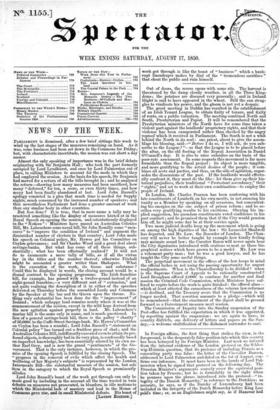NEWS OF THE WEEK.
PAnmurnrr is dismissed, after a few brief sittings this week to wind up the last stages of the measures remaining on hand. As it 'was, some business had been set down in the Commons for Friday; bat, with characteristic incertitude, the session was cut short a day sooner.
Almost the only speaking of importance was in the brief debate originating with Sir Benjamin Mall; who took the part formerly occupied by Lord Lyndhurst, and once by Lord Palmerston out of place, in calling Ministers to account for the mode in which they had employed the session. As the basis for his speech, Sir Benjamin had moved for a return of all the bills brought in ; and he analyzed the return—showing how many measures had been sacrificed, how
many "deferred," for ten, a score, or even thirty times, and how many had been finally abandoned at last. Lord John Russell's apology consisted in a plea that much time is needed for Supply nights, much consumed by the increased number of speakers ; and that nevertheless Parliament had done a greater amount of work than any similar body in other countries. - lint how done? It is true, that in mere name a tally may be mustered something like the display of measures hinted at in the Royal Speech on opening the session, and ostentatiously displayed in the " Notices " : Ministers have passed an Australian Colonies Bill, Mr. Labouchere some naval bill, Sir John Romilly some " mea- sures " to "improve the condition of Ireland" and augment the diminished number of electors in that country; Lord john made his speech on Colonial policy, Mr. Hawes got his Committee on Ceylon grievances ; and Sir Charles Wood said a great deal about savings-banks. But what has come of all these things, sub- stantially; what has been effectually realized ? It will not do to enumerate a mere tally of bills, as if all the virtue lay in the titles and the number thereof; otherwise Fitzball might be accounted a greater writer than Shakspere. What is the execution of the work, its tissue and substance ? Could this be displayed in words, the closing account would be a dismal contrast to the opening programme. The Irish franchise Bill, for example has passed with a twelve-pound instead of an eight-pound franclise,—a very different sort of "extension," and not quite realizing the description of it in either of the speeches delivered on Thursday before the assembled Lords and Commons by the Speaker at the bar and the Queen upon the throne. No- thing very substantial has been done for the " improvement " of Ireland ; which unhappy land remains nearly where it was at the commencement of the session, except in the wild hope derived from the new agitation against property in land. Mr. Labouchere's lifeline bill is the same only in name, and is much questioned. In lieu of a general savings-bank bill, there is the paltry " charity " of 30,0001. to the Cuffe Street Savings-bank. Mr. Hawes's Committee on Ceylon has been a scandal ; Lord John Russell's "statement on Colonial policy" has turned out a fruitless piece of chat ; and the Australian Colonies Bill, indifferently executed even to attain its pro- fessed objects, is thoroughly bad in its very plan, is confessedly based on imperfect knowledge, has been essentially altered by its own au- thor Earl Grey, and is now the grand " pentimento ' of the Go- vernment. That is the only instance, however, in which the pro- mise of the opening Speech is fulfilled by the closing Speech. The "progress in the removal of evils which affect the health and wellbeing of her Majesty's subjects" is represented by the London, Interments Bill—the substantial measure of the session, but sole item in the category to which the Royal Speech so prominently alludes.
Lord John Russell's boast of the work got through can only be made good by including in the account all the time wasted in vain debates on measures not prosecuted, in blunders in idle motions to which the Ministerial lack of mastery and lead in the House of Commons gave rise, and in small Ministerial defeats. His boast of work ot through is like the boast of " business " which a bank- rupt hnendraper makes by dint of the "tremendous sacrifices" that cheat the public and ruin himself.


























